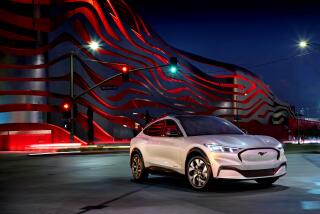Firestone Seeks Probe of Explorer
- Share via
DETROIT — Tire maker Bridgestone/Firestone Inc. asked the government Thursday to launch a safety investigation of Ford Motor Co.’s Explorer, the country’s best-selling sport-utility vehicle, saying a new study shows certain models are “defectively designed.”
Ford Explorers tested by a professor at Ohio State University showed a propensity to over-steer, or turn more tightly than drivers intend, after a tire failure such as a tread separation, Bridgestone/Firestone Chief Executive John Lampe said.
The study “shows that certain of the Explorer models will experience an ‘over-steer’ condition in most circumstances following a tread separation on a left rear tire,” Lampe said in a letter to L. Robert Shelton, acting head of the National Highway Traffic Safety Administration.
Ford sharply disputed the allegations, maintaining that the Explorer has one of the best safety records on the market.
Firestone’s move was the latest salvo in a war of words and statistics between the former close partners over a series of fatal accidents involving Explorers and Firestone brand tires that has increasingly high stakes: Bridgestone/Firestone is trying to save its battered business, while Ford is pulling out all stops to deflect blame from its popular and profitable SUV.
The study was conducted by Dennis Guenther, an OSU professor of mechanical engineering. Lampe quoted Guenther as saying: “An over-steer vehicle is not safe at highway speeds in the hands of an average driver. This must be regarded as a highway safety defect within the meaning of the NHTSA’s charter.”
Over-steer refers to making a turn where the front of a vehicle turns more sharply then the driver intends. Under-steer is a cornering situation where the vehicle’s front turns less than the driver intends.
Guenther’s study of Explorers “shows there is a serious safety issue” with the vehicles, which are “defectively designed in that they have an inadequate margin of control” during sudden sharp turns after a tread separation, Lampe said.
Ford Chief of Staff John Rintamaki, responding to Firestone’s claim, said in a statement: “You can talk about testing data endlessly. We are replacing Firestone Wilderness AT tires because they have elevated rates of tread separation in the real world. Real world data also show the Explorer is among the safest vehicles on the road.”
Ford announced last week that it is voluntarily recalling all 13 million Firestone Wilderness AT tires on Ford and Mazda vehicles. Bridgestone/Firestone recalled half that many tires last year, including other Wilderness ATs, scores of which lost their treads at high speeds, causing at least 174 deaths in recent years.
Last week Firestone said it was severing its 95-year relationship with Ford, bringing to an end one of the oldest partnerships in the auto industry. Henry Ford and Harvey Firestone were close friends at the turn of the century, and current Ford Chairman William Clay Ford Jr. is the great-grandson of both of them.
Guenther tested a 1996 four-door, two-wheel-drive Explorer with Goodyear tires; a similar Explorer with Firestone tires; a 2000 four-door, two-wheel-drive Explorer with unspecified tires; a 2001 four-door, two-wheel-drive Jeep Cherokee, and a 1996 four-door, two-wheel-drive Chevrolet Blazer.
He conducted the tests over the last month at the Transportation Research Center outside Marysville, Ohio, the facility that NHTSA uses for some of its vehicles tests, Bridgestone/Firestone said. It said his results show all the Explorers with significant over-steer when making a right-hand turn with the left rear tire having lost its tread.
Guenther noted that “the engineering literature proves that a tread separation does not ordinarily cause a vehicle to lose control,” Lampe said.
Countering Bridgestone/Firestone’s latest claim, Ford shared “reams of data” with NHTSA and the tire maker in March showing that only 7% of Firestone tread separations on Explorers lead to rollover accidents, a Ford spokesman said. Transportation Department data show the Explorer has a 19% lower fatality rate in rollovers than other vehicles in its class, he said.






